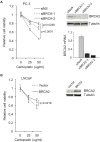The association between germline BRCA2 variants and sensitivity to platinum-based chemotherapy among men with metastatic prostate cancer
- PMID: 28608931
- PMCID: PMC5802871
- DOI: 10.1002/cncr.30808
The association between germline BRCA2 variants and sensitivity to platinum-based chemotherapy among men with metastatic prostate cancer
Abstract
Background: Breast cancer 2 (BRCA2)-associated breast and ovarian cancers are sensitive to platinum-based chemotherapy. It is unknown whether BRCA2-associated prostate cancer responds favorably to such treatment.
Methods: A retrospective analysis of a single-institution cohort of men with castration-resistant, metastatic prostate cancer was performed to determine the association between carrier status of pathogenic BRCA2 germline variants and prostate-specific antigen response to carboplatin-based chemotherapy. From 2001 through 2015, 8081 adult men with prostate cancer who had a consultation and/or underwent treatment at Dana-Farber Cancer Institute provided blood samples and consented to analyses of biologic material and clinical records. A subgroup of 141 men received at least 2 doses of carboplatin and docetaxel for castration-resistant disease (94% were also taxane refractory). These patients were categorized according to the absence or presence of pathogenic germline mutations in BRCA2 based on DNA sequencing from whole blood. The primary outcome was the response rate to carboplatin/docetaxel chemotherapy, defined according to a decline in prostate-specific antigen that exceeded 50% within 12 weeks of initiating this regimen. Associations between BRCA2 mutation status and response to carboplatin-based chemotherapy were tested using the Fisher exact test, with a 2-sided P value < .05 as the threshold for significance.
Results: Pathogenic germline BRCA2 variants were observed in 8 of 141 men (5.7%; 95% confidence interval, 2.5%-10.9%). Six of 8 BRCA2 carriers (75%) experienced prostate-specific antigen declines >50% within 12 weeks, compared with 23 of 133 noncarriers (17%; absolute difference, 58%; 95% confidence interval, 27%-88%; P < .001). Prostate cancer cell lines functionally corroborated these clinical findings.
Conclusions: BRCA2-associated, castration-resistant prostate cancer is associated with a higher likelihood of response to carboplatin-based chemotherapy than non-BRCA2-associated prostate cancer. Cancer 2017;123:3532-9. © 2017 American Cancer Society.
Keywords: DNA damage repair; breast cancer 2 (BRCA2); carboplatin; castration resistance; prostate cancer.
© 2017 American Cancer Society.
Conflict of interest statement
Figures


Comment in
-
Exploiting DNA damage without repair: The activity of platinum chemotherapy in BRCA-mutated prostate cancers.Cancer. 2017 Sep 15;123(18):3441-3444. doi: 10.1002/cncr.30806. Epub 2017 Jun 13. Cancer. 2017. PMID: 28608923 No abstract available.
References
MeSH terms
Substances
Grants and funding
LinkOut - more resources
Full Text Sources
Other Literature Sources
Miscellaneous

